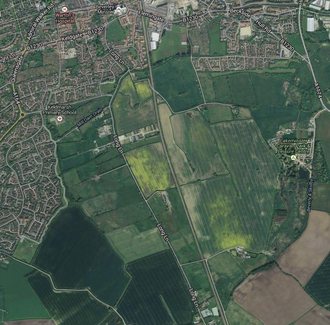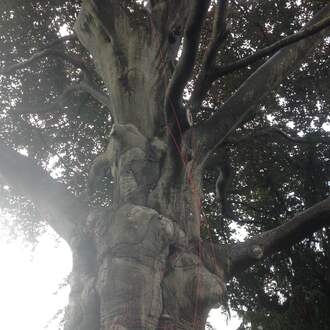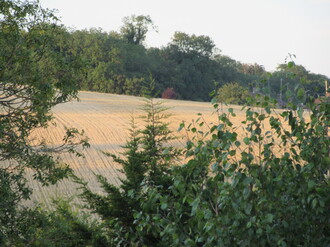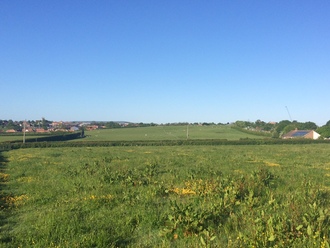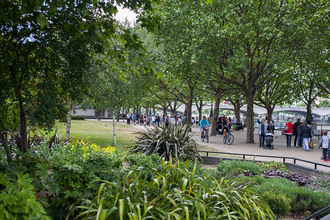-
Save Beverley’s Remaining Green SpacesWhilst we accept that more houses are needed in the Beverley area, we are deeply concerned about the scale of housing developments proposed for Beverley, as detailed by ERYC in various documents, including the emerging East Riding Local Plan: 3,000 houses are proposed in a town with a current population of 30,000. Most recently, the Draft Masterplan for the South West of Beverley shows a level of housing density well in excess of the existing housing in the vicinity: 1,900 houses, which is equivalent to approximately 35 houses per hectare, as opposed to the current 20 houses per hectare in the neighbouring Lincoln Way development, in other words, not in keeping with the character for the area. In 2011 the Beverley Renaissance Partnership called for a large area of open space for public recreational use, a new common, tentatively called Southwood, to complement the existing pastures elsewhere in Beverley, something the new Draft Masterplan has now omitted. Currently only 10 hectares of the 80 hectare development are proposed as green space and this is in small patches scattered around the development. This area needs to be larger and joined up into a coherent chunk of land that will provide a useful recreational space, a green lung for the town, and ensure that Beverley does not become just another suburb of Hull. We call on ERYC to amend the above Draft Masterplan to reflect a level of development more in keeping with the area. We also ask that Beverley retain the existing quality of life for present and future residents by preserving and expanding its green spaces for recreational use and, in the process, protect and preserve our local wildlife.1,082 of 2,000 SignaturesCreated by Beate Willar
-
KEEP HYNDBURN FRACK FREEUnconventional gas exploitation - "fracking" - is a ridiculous idea. The Government's arguments used to justify fracking are as follows: That it will create jobs, that it’ll bring down energy bills, that it’s good for our energy security and it's a transition fuel to a green energy economy. 1. That it will create jobs. A Department for the Environment and Climate Change’s (DECC) report estimated a maximum of 24,300 of them. Yet 400,000 jobs could be created by 2020 by investment in the clean energy sector. 2. That it’ll bring down energy bills like it has in the US. But the UK’s geology is more complex than in the US, which means that the process here will be uneconomic. Even if that wasn’t the case, unlike the US, the UK exports gas as part of a European gas market, and as fracking companies will sell to the highest bidder of these European countries, there could never be a guarantee that UK energy users would be the beneficiaries. 3. That it’s good for our energy security A House of Commons Energy and Climate Change Committee recommendation was that shale gas should not be relied on to contribute to energy security. An energy security expert has said the best way to reduce energy security risks is to promote renewable power generation, improve energy efficiency and reduce overall energy demand. 4. A transition fuel to a green energy economy. Department for Energy and Climate Change-commissioned report on fracking’s greenhouse gas emissions has been shown to be based on poor data and exaggeration. When the actual figures are factored-in, the report shows that burning shale gas to produce electricity is about as bad as, or very possibly even worse than burning coal! The arguments against fracking are so numerous: The UK’s geology is too complex for fracking to be safe or economic. The UK’s geography means we don’t have America’s wide open spaces away from the population or agriculture. Water contamination. The UN has listed seven different ways this can occur. The huge quantities of water required. The carcinogenic properties of the chemicals used. Air pollution. Earthquakes. Industrialisation of countryside and loss of agricultural land to roads, well-pads, pipelines, compressor stations and so on. Traffic/chemical spills/noise and light pollution. Impact on tourism. Even if none of the above applied this doesn’t discount the big one – climate change. A growing number of climate change scientists are recognising that to have any chance of us staying below the two degree increase in global temperature that is required to avoid catastrophic climate change, we have to leave 80% of all already discovered fossil fuels in the ground. So why does this government want to find more of the stuff if we can’t burn it? Not all governments are hell bent on fracking - far from it. There are bans or moratoriums on fracking in France, Germany, many American states, and at least twelve other countries worldwide. And there are attractive alternatives, particularly for the UK as we have the best renewable energy resources in Europe. That’s where our energy security is - and the 400,000 jobs to get our economy back on track. A policy of support for fracking is a vote-loser. As elected representatives of Hyndburn we the community call on you to say no to fracking and yes to keeping Hyndburn frack free?199 of 200 SignaturesCreated by Kerry Gormley

-
Greg Clark: Call proposals for Camberwell Old and New Cemeteries in for Public InquiryThe Camberwell Cemeteries are rich in biodiversity. Over 10 acres of rare designated Grade 1 SINC woodland are immediately under threat in Camberwell Old Cemetery. These woods are full of flora, fauna and protected species, as well as Ancient and Veteran Oaks and Hawthorns. Southwark council also want to fell a virgin native broadleaf wooded hilltop in Camberwell New Cemetery, another rare landscape for London. Over 9,000 people have signed a petition online and on paper to declare the Camberwell Cemeteries Nature Reserves. These biodiverse areas of Metropolitan Open Land on the Green Chain Walk are hugely valuable social and environmental assets - for mental and physical health and wellbeing, access to wild nature, cleaning the air, absorbing storm water, cooling the city, and providing beautiful, historical places to be in nature. Southwark's proposals will cause enormous negative impacts to nature and people. They have done no Environmental Impact Assessment, no Public Consultation, no CAVAT or I-Tree assessment, no Cost Benefit Analysis or financial, social or environmental comparison with alternatives put forward by the community. Many other vital pieces of information are either being withheld or are unavailable. These woodlands and graveyards should be valued and protected as Memorial Park Nature Reserves, and treated with the sensitivity and respect they deserve for future generations - not destroyed for a few years of inner city burial not accessible to all faiths. Help us save these woods and create natures reserves for all of London. For more information and means to object: www.savesouthwarkwoods.org.uk787 of 800 SignaturesCreated by Blanche Cameron
-
Save Frome Copper BeechThe iconic copper beech in St. John's churchyard is scheduled to be felled ASAP. Recent survey work has found increasing levels of decay, and Mendip District Council health and safety have decided they would rather fell the tree to avoid liability, than manage it properly. There are several options which could be considered, including further crown reductions, excluding access to prevent soil compaction, and applying mulches to improve root growth. Hollow trees are very common. As trees become older, hollows or cavities can form due to a variety of factors - often through the work of fungi. This is a natural part of the life of a tree. Hollow trees can continue to live for a long time despite having large central cavities, and this does not usually cause them to become dangerous. This report from the Woodland Trust has lots of useful information about hollow trees. http://goo.gl/FTSF4E The report states: "Hollowing trees are also not necessarily structurally unsound, indeed the great storm of 1987 showed hollow trees may be as strong, if not stronger, than younger solid trees because they are more flexible." Hollow trees provide a fantastic and declining habitat for wildlife species including bats, birds and invertebrates. These important ecosystems are becoming more and more rare, partly because of the over-cautious felling of trees as they reach this life stage and begin to show evidence of decay. This iconic tree is a landmark feature of Frome. Though surveys have found the decay in the trunk is significant, the tree appears outwardly healthy and is in a sheltered location. Felling the tree now would be over-cautious, and would be a tragedy for Frome.202 of 300 SignaturesCreated by Zak Gratton
-
Save the Blakes Walk poplars in Lewes, East SussexThe poplars along the east side of Blakes Walk in Lewes East Sussex are to be cut down as part of the new development on the land adjoining Southdowns Road (Ref. SDNP/15/01303/FUL). For context, these are the tall trees to the east of the recreation ground at South Malling, on the opposite side to the river. Grid Ref. 541756,110897. Regardless of the rights and wrongs of this development, this destruction of trees, described as "poor" by the East Sussex County Landscape Architect Virginia Pullan, is completely unjustified and will substantially alter the character of this public footpath, used by the residents of Malling to walk into town. Her views, based on those given by James Newmarch, the Highway Tree Officer at East Sussex County Council, have been passed on to Stephen Cantwell at the South Downs National Park Authority. You can read her opinion, and decide for yourself HERE: http://planningpublicaccess.southdowns.gov.uk/online-applications/applicationDetails.do?activeTab=documents&keyVal=NL6WUXTUFIG00 (Document dated 7/8/15 entitled 'ESCC Landscape Architect) However according to Town and District Councillor Daisy Cooper, in a quote provided specifically for this petition: “The proposal to fell some of the poplar trees on Blake's Walk flies in the face of British Standards that require processes of demolition and construction to put tree care at their heart. The tree survey recommended retention and protection, and residents staunchly oppose the destruction of trees planted in memory of a valued member of the community. The 79 units got the go ahead but the decision on the trees was bounced back to the County Council who owns them - it's not too late for the County to agree a scheme to protect all the poplar trees on Blake's Walk." Contact details: Virginia Pullan: [email protected] James Newmarch: [email protected] Stephen Cantwell: [email protected]591 of 600 SignaturesCreated by Newell Fisher
-
Save Woodmansterne Green BeltWe want to protect our greenbelt so that future generations can enjoy the benefits of our unspoilt countryside. They are planning on destroying 55 metres of hedgerow and trees without any consideration to the wildlife inhabiting it. A road will be installed through the field. We believe this is for future development. Security fences will block our footpaths which we are currently aiming to register as public right of ways According to our governments manifesto.(they proposed to make it easier for local people to have a say in planning and to save our greenbelt)Every part of this promise has been breached by Reigate and Banstead council. We don't feel the notification procedure was carried through adequately (as in ...very few knew until it was passed) We feel the water company Sutton and East surrey water have badly mismanaged their company and purely led for maximum profit rather than the benefit for the community and our future countryside. Only a decade ago they sold off a large area of their site for housing. They claimed that the reservoir/soakaway lagoon were redundandt and no longer required. Now they say their site is cramped and need an external location for a new lagoon. What next?1,174 of 2,000 SignaturesCreated by Debra Bassett
-
SAVE Liverpool's Lime Street! Call demolition plans in for public inquiry.This is Liverpool's gateway street. It is in the city's World Heritage Site Buffer Zone and is recognized internationally as an extremely important part of Liverpool with great architectural, historical and cultural significance. Listed buildings that would be negatively affected if the scheme goes ahead, include the following: the Anglican cathedral tower (Grade I) and St. Luke’s Church (Grade II*) to the south, and St. George’s Hall (Grade I) and plateau, the Cenotaph (Grade I) Lime Street Station (Grade II) and the Walker Art Gallery (Grade II*), Picton Library (Grade II*) and County Sessions House (Grade II*) to the north. In addition, the Futurist cinema is one of the earliest in the country and Liverpool's first purpose built cinema. Liverpool's World Heritage Site is already in jeopardy and this could push it off the list, flying in the face of international treaties and agreements. The proposals from Neptune Developments, recently approved by Liverpool City Council, involve the demolition of a large site and the replacement of a historic row of buildings with a shopping centre and student accommodation of poor design. The proposed replacement buildings are eleven storeys high, well over what is permitted in this part of the World Heritage Site Buffer Zone. Please see this link for more details and images: http://www.savebritainsheritage.org/news/article.php?id=353809 of 1,000 SignaturesCreated by Clementine Cecil
-
Vote of no confidence in Wealden District CouncilCouncillors should be allowed to use local democracy to refuse developments without the fear of developers overturning decisions through the appeal process and planning inspectorate. Our road systems are proven to be incapable of accepting more traffic, there are insufficient GP’s, school/nursery places and sports/recreational facilities. We also care about protecting our green and rural land (once we lose our countryside, we lose it forever). These issues all need addressing before any more houses are built. Our planning system should ensure local voices are heard and work to stop people's quality of life being affected by increasingly poor services. It is your Community. Do something about it. Join in, protest and sign the Petition. Doing nothing is not an option!2,757 of 3,000 SignaturesCreated by Hailsham Voice
-
Save Sky Tip for St AustellBecause it is now threatened by a planning application to Cornwall Council Number PA14/12186, We ask UNESCO to extend, in perpetuity, the existing local World Heritage Status to embrace the sand burrow called Sky Tip, and otherwise known as the Great Treverbyn or the Carluddon Sky Tip, at West Carclaze, St Austell, in the County of Cornwall. It is a prominent land and sea mark of the town, beloved of its people and all who know the town, as an enduring memorial to all the people and the industry which won the highest grade of China clay from this place for export all over the world; since Josiah Wedgwood and John Carthew formed a Cornish clay company in 1782, after the discovery of China clay, by William Cookworthy, in 1746, at Tregonning Hill. We humbly pray that Sky Tip is as worthy of this recognition and protection as the industrial black hills or Terrils, at Loos-en-Gohelle, Nord-Pas-de-Calais, France.1,673 of 2,000 SignaturesCreated by Nicholas Storey
-
SAVE HAMPSTEAD HEATHThe objectives of the petition are: 1. Save the Vale of Health and other harmless, ornamental ponds from further unwarranted work, damage and disruption. 2. Hold to account those who, knowingly or not, misled the ten councillors into wrongly believing they were receiving independent advise at the Camden hearing: namely Camden Planning and AECOM. 3. Ensure that an iron-clad version of the 1871 Hampstead Heath Act be passed through parliament so that nothing of this sort can ever happen again. It appears Atkins/AECOM/Bam Nutall have now commenced works on the Vale of Health. Realistically this means only 2 of our 3 objectives are 100% achievable. But we will continue to fight so that those responsible are held to account and this manner of financial exploitation of Hampstead Heath can never happen again. We ask all supporters to continue to promote and sign this petition, which will be read out and submitted at a press conference on the 20th of September 2015. Over 160 trees have been felled and large swathes of protected Heathland destroyed. It's a 4000,000/1 chance but we might still be able to save some of the historic ponds and surrounding natural habitat. Having been misled into believing they were receiving independent expert advice, 6 of the 10 elected councillors at a Camden Council hearing granted permission for large dams and various grass spills to be built on and around the ponds of Hampstead Heath. It turns out the council's supposedly independent advisor, AECOM, had already formed a strategic partnership with Atkins, the civil engineers building the dams and was therefore not independent. AECOM and Camden Council need to be held to account for misleading a council hearing and negligence, respectively. Moreover, the Vale of Health pond and other ornamental ponds could still be saved unnecessary damage and 'parkification' if the Secretary of State for the Environment, Liza Truss, steps in and prevents this scandalous pillage of the Heath. Please sign this petition to halt or, at least, downscale the works on Hampstead Heath. If one pond can be spared, one tree saved, it will mean some justice for Hampstead Heath.6,329 of 7,000 SignaturesCreated by Sebastian Wocker

-
Save Brimhay's Woodland Home to Endangered Bats and DormiceThese are highly endangered species and are protected by laws. This wooded valley is a beautiful area and highly valued my hundreds of people in Dartington. It needs protection, not destroying. An alternative community led proposal for housing is available, so destroying the wooded habitat is only for greed not need.391 of 400 SignaturesCreated by Alan White
-
Save our open public spaces - Lambeth CouncilLambeth Council has given notice to dispose of public open space given to them by the Greater London Council in the 1980s. This land has been leased to Coin Street Community Builders (CSCB) with the specific condition that it will remain free public open space for everybody to enjoy without long term commercial development. However the Garden Bridge Trust (GBT) needs this land in order to build a commercial building and CSCB wish to change the terms of their lease to allow this to happen. This completely goes against the core principles of community values fought for - by CSCB. We must not let our open public GREEN space be taken over by private developers. The Thames is London's largest area of central open space, its largest nature conservation area, and its greatest natural feature. Its openness is under threat as there are plans to put a Garden Bridge in the busiest tourist part of London, from Temple Tube Station to the South Bank, at a cost of £175 million. At least £60 million of this will be public money which is utterly iniquitous in these times of great austerity!435 of 500 SignaturesCreated by Hannah Quigley
Hello! We use cookies to improve your experience by providing insights into how the site is being used. Find out more.
